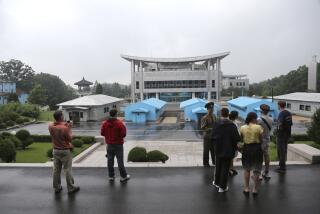U.S. Won’t Push for Faster Payout of S. Korea Package
- Share via
WASHINGTON — The United States signaled Thursday that it will not push for faster disbursement of the $60-billion global rescue package for South Korea’s foundering economy and urged Seoul to speed up economic reforms to stem mounting losses in its financial markets.
Treasury Secretary Robert E. Rubin told reporters the South Koreans had pledged to make reforms demanded by the International Monetary Fund, and “the key is for them to fully and effectively implement that program.”
Rubin’s comments came after another rough day for South Korea’s financial markets. On Thursday, for the fourth day in a row, the country’s currency, the won, plummeted 10% within minutes after trading opened, triggering an automatic shutdown of the markets by the government.
In early morning trading today, the won merely edged lower, but only after South Korea’s central bank intervened heavily in the foreign exchange market. Traders said the outlook for the won remained uncertain.
The won has lost about half its value this year, and retreated by the maximum allowable 10% on each of the past four days.
After opening at a record low of 1,891 to the dollar, the won rebounded to 1,600. But it was unclear how long the central bank can continue to prop up the currency because the nation’s usable foreign reserves have shrunk to an estimated $6 billion.
Meanwhile, South Korean stocks fell today for the fourth time in five days as Dongsuh Securities Co.--Korea’s third-largest brokerage--said it had missed a debt payment and may have to suspend operations.
The latest turmoil was fueled by Wednesday’s disclosure of an IMF memo saying the Korean central bank’s currency reserves had dwindled to $6 billion--enough to pay for about two weeks of imports--instead of the $10 billion Seoul has reported publicly.
The memo also revealed that the country’s short-term foreign debt had soared to $100 billion, rather than the $55 billion the South Korean finance ministry announced previously.
South Korean newspapers quoted Finance Minister Lim Chang Yuel as urging the U.S. and Japan to speed up their share of the rescue package, which is to provide a “second line of defense” if the IMF loan proves insufficient. Washington has pledged $5 billion.
Rubin, however, said Thursday the U.S. has received no such request and signaled that it would not go along with one if it came. South Korea’s best hope for recovery is “to have a strong program and . . . implement it effectively,” he said.
Some analysts have expressed fears that unless the South Korean government can restore confidence in the financial markets soon, the country could soon run out of cash and be forced into what amounts to at least temporary bankruptcy.
However, analysts said Rubin’s response suggested that U.S. officials believed the financial markets had overreacted and that the Seoul government still had a good chance to restore confidence by implementing reforms.
Besides some tightening of fiscal and monetary policy, the IMF wants South Korea to strengthen its banking system, shut down insolvent banks and end the long-standing practice of allowing the government to order banks to prop up ailing corporations.
Meanwhile, South Korea’s economic turmoil continued to intensify as the Korea Development Bank, considered the country’s soundest financial institution, announced it was forced to postpone a badly needed $2-billion bond issue because Moody’s and Standard & Poor’s rating firms had downgraded its bonds.
Further complicating--and hindering--implementation of the reforms, analysts said, is the fact that the government is seeking reelection in voting next Thursday. Some market watchers also criticized Lim for apparently not realizing the full import of appearing to renege on the reforms that he had promised the IMF. “It seems like they just don’t get it,” an analyst for a private financial institution observed.
Insiders said that despite Rubin’s tough talk on Thursday, the administration was not as united as it seemed on whether to try to speed up disbursement of the rescue package to South Korea in an effort to stop the battering by the markets.
International economic experts said there are two schools of thought on how to deal with the issue: press Korea to carry out all its pledged policy changes quickly and see if the rescue package is large enough, or disburse the money now and then push Korea to change.
Rubin’s comments suggested that he supported the first approach, at least for the moment, but officials said others in the U.S. government were not as adamant as the secretary’s remarks would suggest. So far, Rubin’s views have prevailed.
Outside analysts conceded that as of Thursday there appeared to be no reason to accelerate the rescue program. The Koreans still have some $6 billion worth of foreign-exchange reserves that can be tapped to help keep the country solvent.
But they cautioned that if the assault by the markets continues, the country could run out of cash--or come close to it--before next week’s election, forcing it to shut down part of its economy if the IMF money is not speeded up.
Although the international rescue package initially was put at $55 billion, it has been increasing gradually as additional donor countries agreed to contribute. IMF officials said Thursday the package now totals $60 billion.
Philippa K. Malmgren, an analyst with Bankers’ Trust Co. in London, said it was especially important that Korea’s big commercial banks move quickly to roll over their loans to large corporations.
“They’re very close to having to declare a moratorium on the debt,” Malmgren said. “This is a much different situation from the one that they faced even two weeks ago.”
More to Read
Sign up for Essential California
The most important California stories and recommendations in your inbox every morning.
You may occasionally receive promotional content from the Los Angeles Times.










